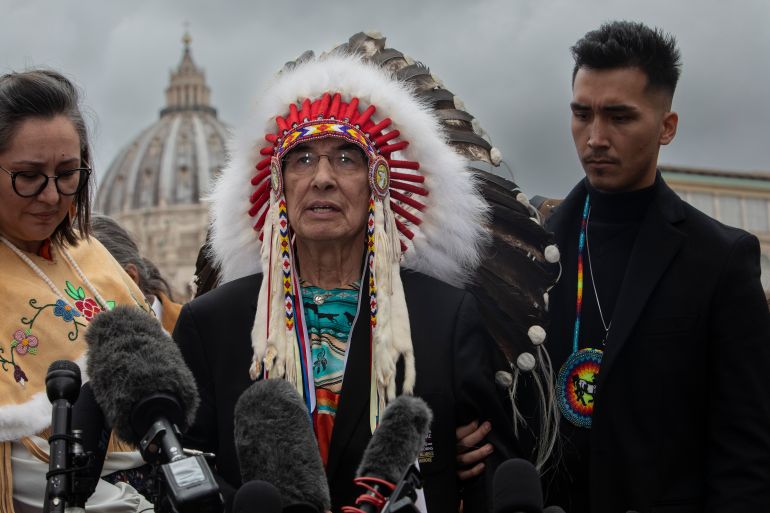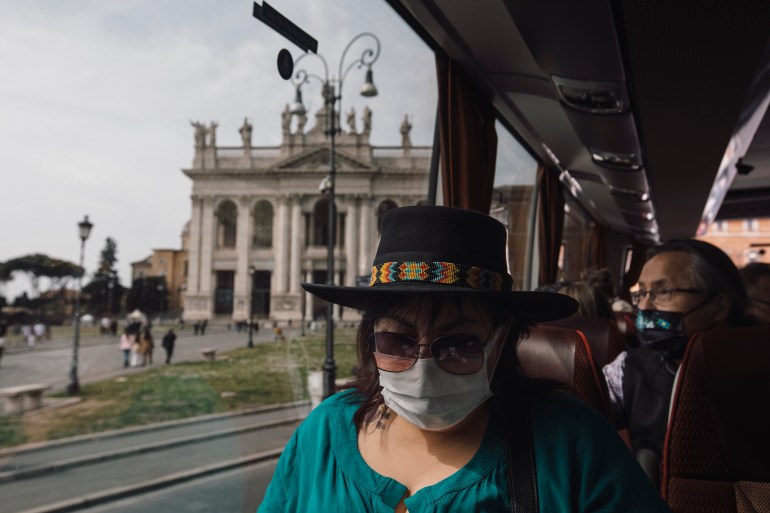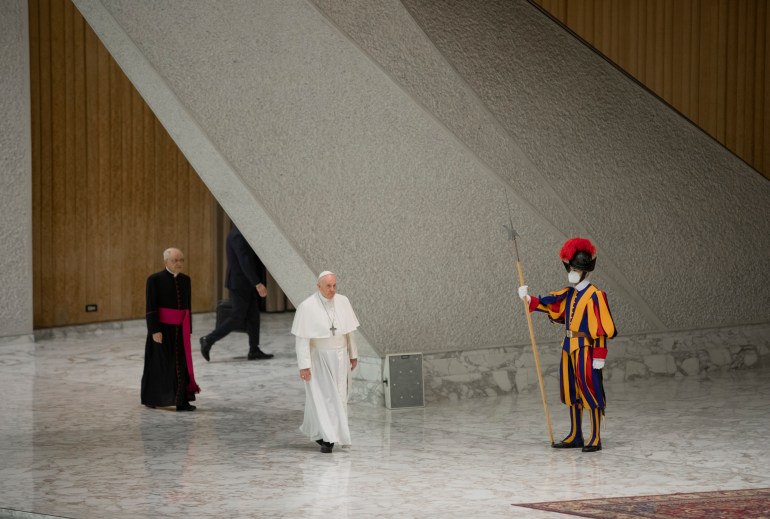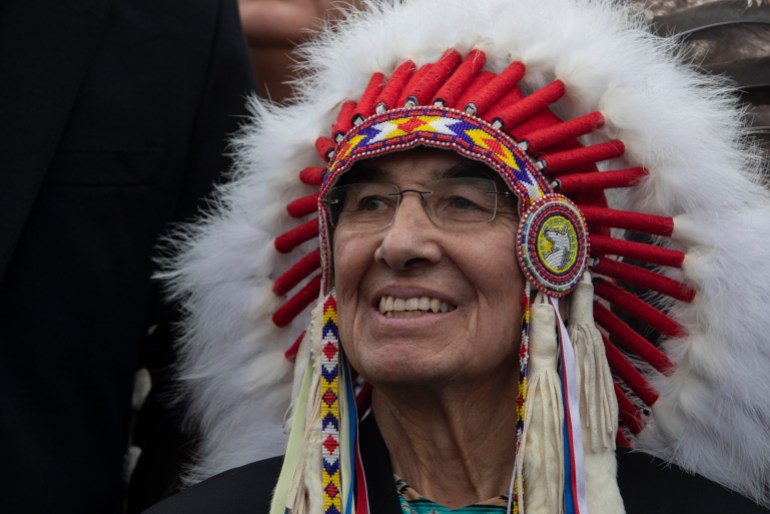‘Walking to justice’: Canada’s residential school survivors
Reporter Brandi Morin accompanied Indigenous survivors of Canada’s church-run residential schools as they went to the Vatican in search of an apology.

Warning: The story below contains details of residential schools that may be upsetting. Canada’s Indian Residential School Survivors and Family Crisis Line is available 24 hours a day at 1-866-925-4419.
As I stepped off the plane on that March morning after a nine-hour flight from Montreal, I felt an enormous burden descend upon my body. Here I was on the land of the original colonisers and although I had prepared for this historic assignment for months, I was unprepared for just how heavy it would feel. I carried with me the countless stories of survivors I had spoken to over more than 10 years of reporting.
Keep reading
list of 4 itemsCurfew announced for under-18s in Australia’s Alice Springs after unrest
‘We exist’: A Himayalan hamlet, forgotten by Indian democracy
A Vision of Justice: Chile’s first blind senator
I was with a delegation of First Nation, Metis and Inuit leaders and survivors of Canada’s church and state-run residential schools – those institutions which, between the 1870s and 1990s, tore Indigenous children from their families and communities and subjected them to physical, emotional, spiritual and sexual abuses which thousands of children did not survive and from which many tens of thousands more never recovered. Abuses that did not end with those who endured them but which lived on in the form of intergenerational trauma.
They had travelled some 7,700km (4,800 miles) from Canada to Rome to participate in a series of groundbreaking meetings over several days with the pope. For many of these Indigenous chiefs, elders, youth representatives and the family members who accompanied them, this was their first time travelling so far from their homes. There was a sense of excitement but also of apprehension – they had been let down so many times before and they could not be sure that this time would be any different.

For decades, survivors had called on the Roman Catholic Church to apologise for its role in the residential schools, more than 60 percent of which it administered. For decades, they had been disappointed as the Church failed to do so. Since the early 1990s, the Anglican Church of Canada, the Missionary Oblates of Mary Immaculate, the Presbyterian Church of Canada and the United Church of Canada had all issued formal apologies for their role in the schools – but there had been no formal apology from the pope.
Then, last summer, thousands of unmarked graves of Indigenous children began to be found on the grounds of former residential schools across Canada. As the heartbreak and trauma endured by Indigenous communities for generations again filled news reports, attention turned to Pope Francis. Would he be the pope to finally apologise?
Soon after the first graves were found, meetings between the pope and the Indigenous delegation were scheduled. They were originally due to take place in December but were postponed over concerns about the Omicron coronavirus variant. There was a sense among the delegates that time was running out. As Wilton Littlechild, a residential school survivor and one of the delegates, told me before we left for Rome, of the approximately 150,000 children who attended the schools, just 40,000 are still alive and as many as four survivors may be dying each day. “Those people went to their grave never having had an apology for what was done to them as children,” he reflected.
‘Under the cloak of the Church’
The unprecedented gathering had attracted journalists from around the world and all of them wanted to talk to the survivors. In order to accommodate these endless requests, many of the survivors gave back-to-back interviews – reliving their trauma over and over again. I could see that it was draining and overwhelming for them. And, unused to working in this way, I felt uncomfortable and out of place. But the survivors I spoke to were gracious and poised.
Throughout our time in Rome, Norman Yakeleya, a Dene survivor of Grollier Hall residential school in Inuvik, Northwest Territories, would chat and joke with people; he remembered everyone’s name and made sure to shout out a greeting whenever he saw them.
When I caught up with him one day as he stepped outside the hotel for a cigarette, he told me it felt freeing to speak so openly about the evils he endured.
“[Back then], we didn’t talk about it. We didn’t feel and we certainly didn’t trust anybody,” he said, his brow furrowed but his gentle brown eyes alight with faith.

“Everything was kept in secrecy under the cloak of the Roman Catholic Church because those people [were not supposed to] do those things we were told. They worked for God.
“So, we lived in our own jails with our own hurts and not knowing what to do and how to say things. When you’re hurt, especially by sexual abuse, as a young boy, you don’t talk about it. There’s a lot of shame. How can another man do that to you? And then try to live a good life as the Bible teaches us? How can you forgive that? Sometimes it doesn’t seem like there’s hope. But I get to live another day here.”
As our conversation ended, I felt inspired by the courage, resolve and determination of survivors like Norman to face the man who represented their abusers.
‘Bad things happened in the dark’
On our second day in Rome, I went to the Colosseum, where warriors once fought to the death in front of thousands of spectators. I was with inter-generational survivor Lorelei Williams, Salish/Coast Salish from Skatin Nations/Sts’Alies, who had travelled to Italy on her own accord. She had spent her own money to get there because she told me she “just had to”. Both of her parents, now deceased, were survivors of St Mary’s Indian Residential School in Mission, British Columbia.
Lorelei wore a stunning red hooded cape with a long train adorned with black handprints representing the souls of Missing and Murdered Indigenous Women and Girls (MMIWG). It was dusk by the time we began our interview and the lights under the arches of the Colosseum cast an orange hue behind her. It felt serendipitous – orange is the colour that represents residential school survivors. As passersby stopped to stare at Lorelei’s beautiful regalia, I knew I was in the presence of a modern-day warrior.

It felt surreal to be in Rome, she told me, but she wanted to carry the message of the crisis facing Indigenous women and girls with her because it is a part of the same violent colonialism as the residential schools.
Although her mother left her residential school alive, Lorelei believes it killed her. She drank herself to death, she explains, to stifle the pain of what happened to her there.
When she told me that her mother slept with the light on for her entire life because “bad things happened in the dark”, I broke. My tears flowed as I realised why my Kohkum (grandmother), a residential school survivor, had slept with the lights on until her death at the age of 74.
I thought of my Kohkum often in Rome and carried the pain of my ancestors as well as the excruciating stories I have heard from survivors over the years.
‘We are still here’
On another day, I accompanied the delegation on part of their tour of the Vatican Museum. The grandeur and opulence were breathtaking. But to watch the delegates in this environment – taking it all in with curiosity and ambivalence – was jarring considering the severe inequalities still faced by Indigenous communities.
I left to wander on my own but stumbled upon an area being prepared for public display – the Indigenous collection.
The “collection” featured a reddish-bronze statue depicting a dying Indigenous man. I choked with disbelief. This was how they were depicting us and our ancestors? But we are not of the past. We were not conquered. We are not dying. We are still here.
A headdress and other ceremonial items were being processed in an office behind a glass wall. I shuddered and walked away. The delegates later requested that the items be returned to Indigenous territories.
‘Bringing our children back home’
Midweek, after a particularly hard day of running around between the Vatican and hotels, news conferences and interviews with delegates, I ran to my hotel toilet and collapsed on the floor. There, on the cold tiles, I sobbed for hours. I felt as if I was releasing centuries of historical and intergenerational trauma. But I still had two more days to go so I prayed for strength, drawing more from the memories of my Kohkum and by thinking of the survivors back home.
On Thursday, as the First Nations delegates were preparing for their private meeting with the pope, I witnessed a powerful scene.

Dressed in colourful regalia, and led by the sounds of singing and drumming, the delegates shut down two blocks of the street in a procession to board the buses that would take them to the Vatican. The average onlooker may not have understood the significance of it, but here were Indigenous survivors who had travelled halfway across the world, proudly walking towards an opportunity for justice to begin.
Angry drivers honked incessantly but their noise faded to nothing in those moments as I watched this marvellous sight – a scene of reclamation, of taking back our identity and everything the colonisers and the Church had tried to violently steal from us.
I thought of the Papal Bull Romanus Pontifex issued in 1455 by Pope Nicolas V which invoked centuries of destruction and genocide in its framework of dominance against Indigenous Peoples and their lands, territories and resources. In their meetings with Pope Francis, the delegates called on him to rescind it. The Church has yet to respond but if it were to do this, it would be a crucial step on the path of reconciliation.

During the private meeting between the First Nations delegates and the pope, Oneida delegate Michelle Schenandoah gave the pontiff an empty cradleboard. It symbolised the lost children of this genocide, she said. She later told me how she had told Pope Francis that he could not keep it, but that it was an opportunity for him to reflect on the children who never came home from the residential schools.
“We left [the cradleboard] empty deliberately so he can understand what that feeling is like for people to lose their children,” she said earnestly. “I made it very clear to him that I’m coming back to retrieve the cradleboard and bring it home. And that’s also representative of us bringing our children back home.”
Dancing in celebration
On the final day of meetings, the pope held an open audience with the delegates at the beautiful Sala Clementina Hall in the Apostolic Palace, I watched via a live feed from the Vatican press office. I leaned in close to my laptop to hear the English translation of what he was saying.
The delegates had invited the pope to Indigenous lands in Canada and hoped to hear an apology there. The general consensus among them was that he would not apologise in Rome. But then I heard the words that took my breath away.
“I have said this to you and now I say it again. I feel shame – sorrow and shame – for the role that a number of Catholics, particularly those with educational responsibilities, have had in all these things that wounded you, in the abuses you suffered and in the lack of respect shown for your identity, your culture and even your spiritual values. All these things are contrary to the Gospel of Jesus Christ. For the deplorable conduct of those members of the Catholic Church, I ask for God’s forgiveness and I want to say to you with all my heart: I am very sorry.”

After so many years, these were the words so many people had longed to hear – an admission of the evils the Church had perpetrated against our people. I had expected to feel cynical about it, but I didn’t. I felt in my spirit that he truly meant it; that he truly grieved with our people.
Still in shock, I ran to St Peter’s Square and sat down on the cobblestone ground to wait for the delegates and the accompanying media scrum to emerge. It had rained for three days straight, but as I looked up at the sky, I noticed the rain had stopped and the clouds had parted. Beams of sunlight shone down upon the emerging delegates.
In the distance, I heard drums and singing so I followed the music further into the square. There, among the towering columns, the world-famous St Peter’s Basilica and magnificent statues of saints and angels, I witnessed a sight more glorious still – our people celebrating.
Littlechild was beaming. It was his 78th birthday and I watched in awe as, wearing his chief’s headdress, he shakily stood up from his walker and began to dance in celebration. As his face lit up in a smile, despite the darkness that had lingered for so long, I felt the weight that I had been carrying smash to the ground. We had finally been given the opportunity to step into the process of forgiveness, justice and healing.

The beginning of justice
This was one of the most difficult assignments of my career. I prepare for my assignments, I pray before them and I have others pray for me. They are incredibly important to me – none more so than this one.
But in Rome, I struggled – emotionally, spiritually and physically – much more than I had anticipated.
Then there were the nightmares. Sometimes I would wake up unable to catch my breath and feel as though my heart was beating out of my chest.

After the pontiff gave his apology, I walked for a while on the land of the colonisers. I talked to my Kohkum in heaven. I felt freer in my soul. The atmosphere shifted; there was hope.
I am back home now but the nightmares continue. Now, we must process what has happened. There will be more tears; anger remains for many and forgiveness and healing is an individual path on which there is no right or wrong way.
Canada paid Churches, including the Catholic Church, to administer what were essentially concentration camps for Indigenous children. It was genocidal. The apology was a momentous deal but it was just the beginning of justice.
There is still much work to be done and many more steps the Indigenous delegates have asked the pontiff to take.
Pope Francis plans to visit Indigenous lands in July where he is expected to deliver an apology once again. I know those words will reverberate into hearts beyond this age, reaching the spirits of those who were lost and benefitting the generations yet to come.